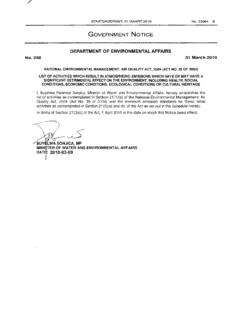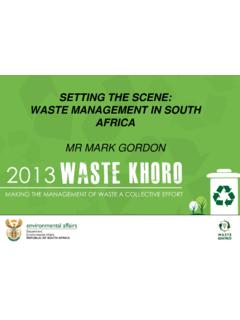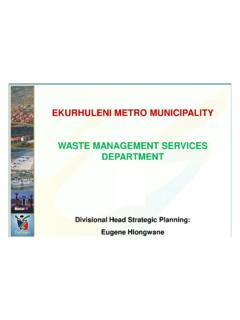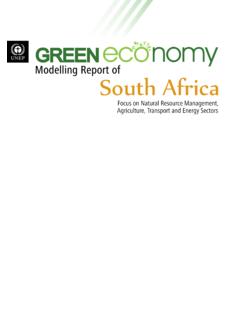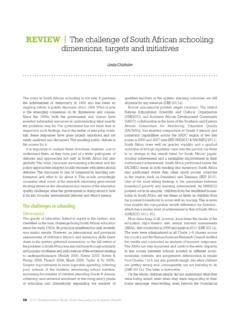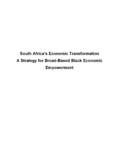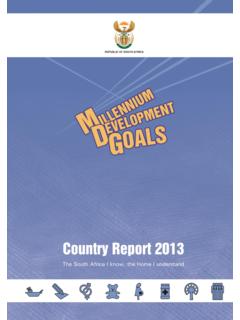Transcription of TOURISM - Department of Environmental Affairs
1 6 TOURISM7 OOver the last tenyears, TOURISM inSouth Africa hasemerged as a leadingeconomic growth sec-tor. It is now one of thelargest contributors toGross Domestic Product(GDP), and offers significantemployment and enterprisedevelopment is the fastest growing economicsector in South Africa, contributing close to7,1% of the GDP. It is a labour-intensiveindustry that brings in foreign revenue andstimulates a broad range of other s phenomenal growth, has been generatedthrough concerted and focused action on the part ofDEAT and its partners, namely the TOURISM industry andcommunities. In respect of the community partnerships, a key part of DEAT swork has been in linking impoverished communities living inareas of high TOURISM potential, to tourist flows through investmentsin both TOURISM infrastructure and products.
2 SSTTAARR AATTTTRRAACCTTIIOONNDEAT`s TOURISM partners alsoincludes its statutory body SouthAfrican TOURISM (SAT), and theTourism Grading Council. SAT isresponsible for South Africa sinternational TOURISM marketingand the Grading Council to setstandards for various tourismproducts and services. ThroughTourism, Hospitality and SportEducation and Training Authority(THETA), learnership pro-grammes, to train and upgrade theskills of people working in thehospitality industry, have beenestablished. This effort has beenfurther boosted by the depart-ment s welcome campaign and SAhost programmes targeted atSouth Africans who frequentlyinteract with tourists for example,people in other governmentdepartments, banking, telecom-munications, transport, conserva-tion and catering to go the has also set up a number ofinitiatives to guide and fundprospective TOURISM entrep-reneurs, particularly through theTourism Enterprise Programme(TEP).
3 TEP assists in establishingbusiness transactions betweenSmall, Medium and MicroEnterprises (SMME) and moreestablished firms. Support is alsoprovided to small businesses toattend and showcase theirproducts at travel shows abroadand in South Africa. In 2004 DEAT funded 254 SMME s to attendIndaba, Africa s premier Travel andTourism trade show in TEP was also a majorsupporter of the Gauteng TourismShowcase in February 2004,which attracted over 150exhibitors. Also in 2004, DEAT funded four and two SMME srespectively to participate in theInternational TOURISM Bourse inBerlin and the Common wealthTravelMart in Kuala Lumpur. Appreciating the potential oftourism in the region s economicgrowth, South Africa has nowbecome an active member of theSouthern African tourismmarketing body, the RegionalTourism Organisation of SouthernAfrica (RETOSA).
4 Participationand membership has also beenextended to international tourisminstitutions as part of an overallstrategy of ensuring that themanagement of the TOURISM sectoris in line with the internationaltrends. In this regard South Africais also a member of the WorldTourism Organisation (WTO) andthe Indian Ocean TourismOrganisation (IOTO), amongstothers. Other forms of internationaltourism relations are at thebilateral level. There are tourismagreements with various countriesthrough which partner countriesboth receive and provide technical8 TOURISM assistance and undertake jointmarketing activities. Throughinternational TOURISM relations,South Africa plays its role withinthe community of nations inpromoting growth anddevelopment through the content of a range ofinterventions including those setout above, TOURISM therefore, isincreasingly playing its role as acatalyst for economic and socialdevelopment across the 11999944 The isolationism of apartheiddelayed SA s entry onto the worldstage in many areas, includingtourism.
5 Prior to 1994 , the potential oftourism to generate jobs, createentrepreneurs, attract foreignincome, enhance economicgrowth and develop ruralcommunities, remained untestedand marketing was existing TOURISM productswere exclusively in the hands ofwhite owners. Community-basedtourism was unknown. The passlaws and influx control had madedomestic leisure travel all butimpossible for the majority of thepopulation. By 1994 , the year ofthe first democratic elections, theannual number of visitors stood AANNDD LLEEGGIISSLLAATTIIOONNS ince the first democratic electionsin 1994 , TOURISM in South Africahas changed fundamentally. Thenew Government identifiedtourism as one of the country s keyeconomic sectors because of itsmassive potential to create newjobs and generate foreign AFRICAN TOURISMA ccording to the World TourismOrganisation: In 2002, Africa attractedapproximately 4% of the totaltourism market, and generated US$475 billion of revenue.
6 Regionally, South Africa is the pre-mier destination, attracting about50% of tourists to the SouthernAfrican Development Communities(SADC) countries. Botswana, Mauritius, Zimbabwe,Kenya, Morocco, Tunisia and Egyptare the other key TOURISM destina-tions. Africa is dominated by intra-regionaltravel in 2000, 42% of all travel toAfrica emanated from within the con-tinent. Europe is the next mostimportant source of visitors, compris-ing over 38% of arrivals. ANew Partnership for Africa sDevelopment TOURISM Action(NEPAD) Plan has been with the NEPADS ecretariat in developing the Africa has managed to achieve relatively high levels of community involvement in nature tourism9revenue. It was one of the fewsectors that showed enormouspotential to provide economicopportunities to historicallydisadvantaged communitiesthroughout the was identified as one ofthe five top economic sectors thatwould reverse a sluggisheconomy, mobilise domestic andforeign investment and developSMMEs.
7 For TOURISM , as with many othersectors, an inclusive, participativeprocess was followed, giving thepreviously excluded members ofsociety a voice in government spolicy-making process. In order to guide the future rate oftourism, and through aparticipative and inclusiveprocess, the 1996 White Paper onthe Development and Promotionof TOURISM in South Africa wasdeveloped. The White Paperestablishes the vision of a tourismindustry that would be government-led, private-sectordriven and community-based. TheWhite Paper also sets the stagefor responsible TOURISM as the keyguiding principle for tourismdevelopment in the country. Another important contribution ofthe process of formulating policywas that, it forged consensus andcollaboration between role-playersin government and industry.
8 As aresult, a strong public-privatetourism partnership has AAPPPPRROOAACCHHEESSThe key objective of TOURISM inSouth Africa over the past decadehas been to enhance its role as adriver of socio-economicdevelopments. In this regard, DEAT s TOURISM goalhas been to create conditions forsustainable TOURISM growth anddevelopment for the benefit of allSouth Africans. The departmenthas sought to achieve this throughensuring effective and efficientdomestic and internationalmarketing; developing acompetitive and transformedtourism product and servicesplatform; addressing gaps in thetourism logistics value chain andbuilding a TOURISM , DEAT hasendeavoured to strengthencooperative governance in thetourism sector; to promote regionaland continental TOURISM growth;and to lead South Africans in acoherent and effectiveengagement in internationalagreements and events in the past ten years some ofthe strategic TOURISM developmenthighlights have included thefollowing: The formation of the TourismBusiness Council of SouthAfrica, as the representativeof South Africa s tourismindustry (1996).
9 The establishment, byprovinces, of provincialtourism bodies andmechanisms to develop thissector; Amendment of the TourismAct to transform the SouthAfrican TOURISM Board (1999); Grading Council of SouthAfrica constituted to drive thegrading system previouslyunder South African TOURISM (2000); Cabinet approval of theUnblocking Strategy in 10 TOURISM TOURISM through which otherGovernment Departmentsand spheres of governmentwould assist, through theiractivities, to grow TOURISM (2000); Cabinet approval of theTourism TransformationStrategy (2001); Enactment of the SecondTourism Amendment Act,formalising tourist guiding(2001); Ratification by South Africa ofthe SADC TourismDevelopment Protocol (2002); Signing of tourisminternational agreements withabout twenty countries; South Africa joined variousinternational tourismorganisations, including WTO,RETOSA, IOTO and theAfrica Travel Association(ATA);RReessppoonnssiibbllee TToouurriissmmAccording to the 1996 White Paper on the Development and Promotion of TOURISM in South Africa, responsibletourism was described as an absolute necessity if South Africa is to emerge as a successful internationalcompetitor.
10 Guidelines as well as a manual for Responsible TOURISM were designed by DEAT during 2002 asa basis for implementing responsible TOURISM practices throughout the TOURISM industry. Responsible TOURISM took a major step forward in 2002 with the inception of the annual Imvelo Awards forResponsible TOURISM in the hospitality industry and a year later, with the introduction of the Fair Trade in TourismSouth Africa trademark. Responsible TOURISM essentiallypromotes principles that emphasiseaccountability to: the environment throughbalanced and sustainabletourism activities; local communities living neartourism attractions; local culture, throughpreventing over-commercialisation andexploitation, and throughpromoting respect; the safety, security and healthof visitors; and employers and employees,both to each other and to theircustomers.






